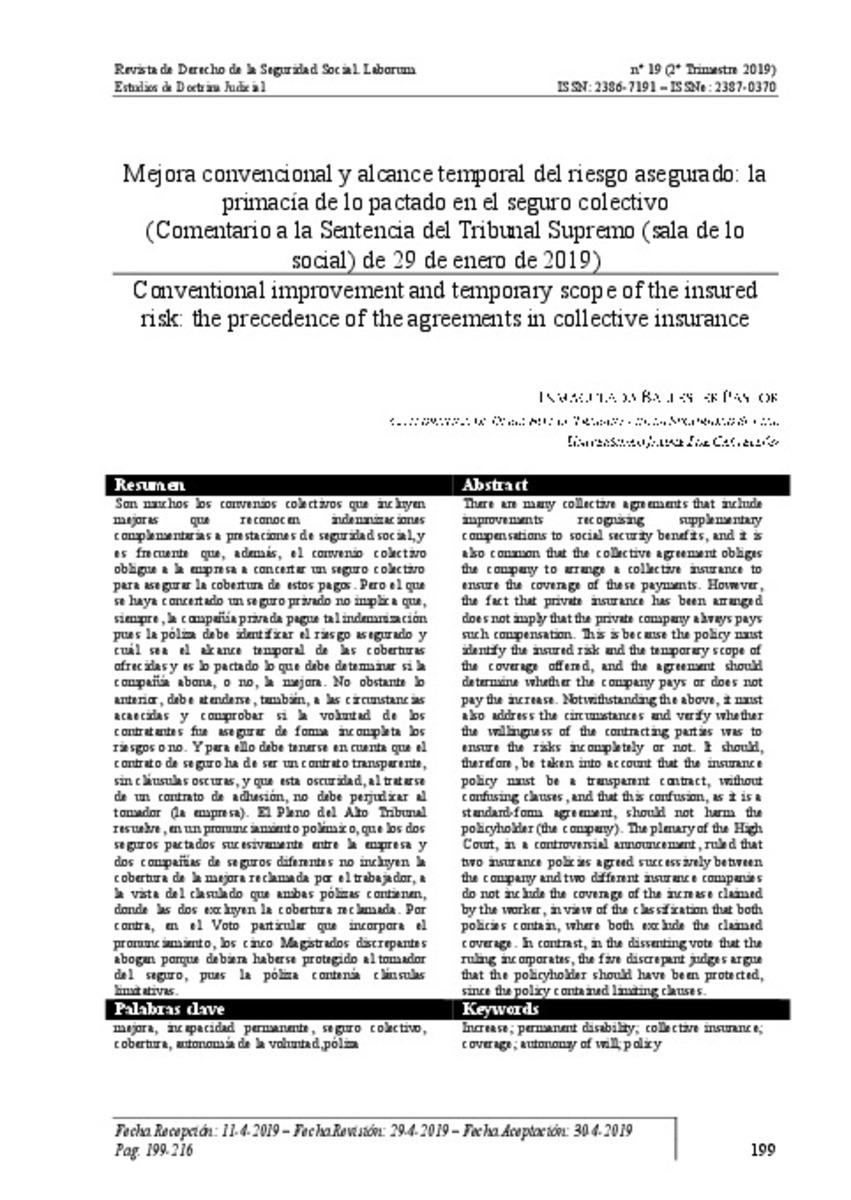Mostrar el registro sencillo del ítem
Mejora convencional y alcance temporal del riesgo asegurado: la primacía de lo pactado en el seguro colectivo (Comentario a la Sentencia del Tribunal Supremo (sala de lo social) de 29 de enero de 2019)
| dc.contributor.author | Ballester Pastor, Inmaculada | |
| dc.date.accessioned | 2019-10-04T14:38:48Z | |
| dc.date.available | 2019-10-04T14:38:48Z | |
| dc.date.issued | 2019 | |
| dc.identifier.citation | BALLESTER PASTOR, Inmaculada. Mejora convencional y alcance temporal del riesgo asegurado: la primacía de lo pactado en el seguro colectivo (Comentario a la Sentencia del Tribunal Supremo (sala de lo social) de 29 de enero de 2019). Revista de Derecho de la Seguridad Social, Laborum, 2019, núm. 19, p. 199-216 | ca_CA |
| dc.identifier.issn | 2386-7191 | |
| dc.identifier.issn | 2387-0370 | |
| dc.identifier.uri | http://hdl.handle.net/10234/184071 | |
| dc.description.abstract | Son muchos los convenios colectivos que incluyen mejoras que reconocen indemnizaciones complementarias a prestaciones de seguridad social, y es frecuente que, además, el convenio colectivo obligue a la empresa a concertar un seguro colectivo para asegurar la cobertura de estos pagos. Pero el que se haya concertado un seguro privado no implica que, siempre, la compañía privada pague tal indemnización pues la póliza debe identificar el riesgo asegurado y cuál sea el alcance temporal de las coberturas ofrecidas y es lo pactado lo que debe determinar si la compañía abona, o no, la mejora. No obstante lo anterior, debe atenderse, también, a las circunstancias acaecidas y comprobar si la voluntad de los contratantes fue asegurar de forma incompleta los riesgos o no. Y para ello debe tenerse en cuenta que el contrato de seguro ha de ser un contrato transparente, sin cláusulas oscuras, y que esta oscuridad, al tratarse de un contrato de adhesión, no debe perjudicar al tomador (la empresa). El Pleno del Alto Tribunal resuelve, en un pronunciamiento polémico, que los dos seguros pactados sucesivamente entre la empresa y dos compañías de seguros diferentes no incluyen la cobertura de la mejora reclamada por el trabajador, a la vista del clasulado que ambas pólizas contienen, donde las dos excluyen la cobertura reclamada. Por contra, en el Voto particular que incorpora el pronunciamiento, los cinco Magistrados discrepantes abogan porque debiera haberse protegido al tomador del seguro, pues la póliza contenía cláusulas limitativas. | ca_CA |
| dc.description.abstract | There are many collective agreements that include improvements recognising supplementary compensations to social security benefits, and it is also common that the collective agreement obliges the company to arrange a collective insurance to ensure the coverage of these payments. However, the fact that private insurance has been arranged does not imply that the private company always pays such compensation. This is because the policy must identify the insured risk and the temporary scope of the coverage offered, and the agreement should determine whether the company pays or does not pay the increase. Notwithstanding the above, it must also address the circumstances and verify whether the willingness of the contracting parties was to ensure the risks incompletely or not. It should, therefore, be taken into account that the insurance policy must be a transparent contract, without confusing clauses, and that this confusion, as it is a standard-form agreement, should not harm the policyholder (the company). The plenary of the High Court, in a controversial announcement, ruled that two insurance policies agreed successively between the company and two different insurance companies do not include the coverage of the increase claimed by the worker, in view of the classification that both policies contain, where both exclude the claimed coverage. In contrast, in the dissenting vote that the ruling incorporates, the five discrepant judges argue that the policyholder should have been protected, since the policy contained limiting clauses. | ca_CA |
| dc.format.extent | 18 p. | ca_CA |
| dc.format.mimetype | application/pdf | ca_CA |
| dc.language.iso | spa | ca_CA |
| dc.publisher | Ediciones Laborum | ca_CA |
| dc.relation.isPartOf | Revista de Derecho de la Seguridad Social, Laborum, 2019, núm. 19, p. 199-216 | ca_CA |
| dc.rights | Copyright (c) 2019 Revista de Derecho de la Seguridad Social, Laborum | ca_CA |
| dc.rights.uri | http://rightsstatements.org/vocab/InC/1.0/ | * |
| dc.subject | mejora | ca_CA |
| dc.subject | incapacidad permanente | ca_CA |
| dc.subject | seguro colectivo | ca_CA |
| dc.subject | cobertura | ca_CA |
| dc.subject | autonomía de la voluntad | ca_CA |
| dc.subject | póliza | ca_CA |
| dc.subject | increase | ca_CA |
| dc.subject | permanent disability | ca_CA |
| dc.subject | collective insurance | ca_CA |
| dc.subject | coverage | ca_CA |
| dc.subject | autonomy of will | ca_CA |
| dc.subject | policy | ca_CA |
| dc.title | Mejora convencional y alcance temporal del riesgo asegurado: la primacía de lo pactado en el seguro colectivo (Comentario a la Sentencia del Tribunal Supremo (sala de lo social) de 29 de enero de 2019) | ca_CA |
| dc.title.alternative | Conventional improvement and temporary scope of the insured risk: the precedence of the precedence agreements in collective insurance | ca_CA |
| dc.type | info:eu-repo/semantics/article | ca_CA |
| dc.rights.accessRights | info:eu-repo/semantics/openAccess | ca_CA |
| dc.relation.publisherVersion | http://revista.laborum.es/index.php/revsegsoc/article/view/356 | ca_CA |
| dc.type.version | info:eu-repo/semantics/publishedVersion | ca_CA |
Ficheros en el ítem
Este ítem aparece en la(s) siguiente(s) colección(ones)
-
DTR_Articles [240]







